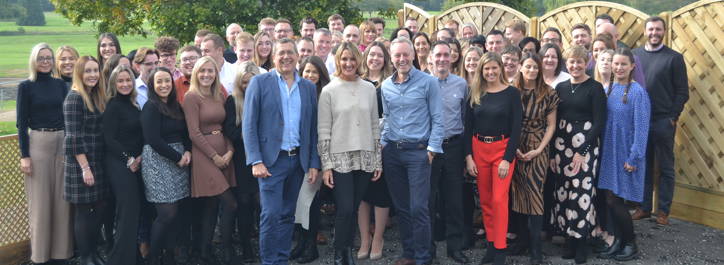Kicking off the People Leaders Lab
We recently held the first session of the People Leaders Lab – a new programme of events bringing HR professionals together to discuss a variety of topics. Created with our friends at Birketts, the first session focused on how organisations can embrace neurodiversity and build more inclusivity in their workplaces. We’re really excited about this new programme, so we’ve put this article together to give you the inside track on what happened on the day.
On a foggy winter’s morning in November 2023, over 40 HR leaders gathered at the Babraham Research Campus in Cambridge to take a deep dive into the realm of neurodiversity. The speaker at the session was Dr Deborah Leveroy, a neuro-inclusion practitioner and academic. She’s also Head of Consultancy and Research at Neurobox, a workplace adjustments provider that builds inclusive and accessible work environments.
What did we talk about?
The main discussion points included:
- the employee lifecycle from the perspective of an autistic and dyslexic employee, and the challenges and tipping points in that cycle
- ways to mitigate performance management issues, and employee disengagement
- disclosure and behavioural signs
- workplace adjustments and inclusive practices.
Deborah’s talk in detail
Deborah started by telling us some interesting numbers:
- in 2021 there was a 125% increase in online searches for neurodiversity
- 80% of Generation Z (i.e. people born between the mid-1990s and the early 2010s) are more likely to apply to work at companies that have neurodiverse policies in place – but only 10% of companies have a neurodiversity or disability policy
- 50% of line managers are uncomfortable managing a neurodiverse employee
- there was a 33% increase in discrimination cases relating to neurodiversity in 2021 and 2022.
Deborah then focused on three areas:
- exploring signs and triggers
- the disclosure dilemma
- workplace adjustments and inclusive practices.
Here’s some more information on each of those.
Exploring signs and triggers
Deborah began this section talking about how neurodivergent people could be:
- skilled mathematicians who can’t tie their shoelaces
- confident public speakers who can’t write reports
- brilliant story writers who can’t remember timetables.
Deborah then went on to talk about understanding the ‘cognitive landscape’, i.e. what’s going on above and below the surface (like sailing on the sea and seeing both above and below the water). There’s definitely a benefit for HR professionals to understand this, and how it affects their people and the workplace.
Next, Deborah talked about neurodiverse triggers. These can be as simple as changes at work – like a new role, manager or team, new systems, a restructure, coming back after a break from the workplace, training, and so on. Triggers can also be acquired neuro differences, e.g. people who develop neurological conditions after a traumatic brain injury, for example, have post-stroke cognitive and communication difficulties, mental health conditions or even dementia.
It’s important that we’re all aware of triggers for both ourselves and for others.
The disclosure dilemma
Deborah then talked to us about the many reasons why people don’t tell their employer about their neurodiversity – for example, they might be concerned about being stigmatised, that it’ll impact their prospects, or worried about who else will see this information. She then explained how leaders can encourage disclosure, and when it’s appropriate to do so. She recommended the following strategy:
- change the language to self-advocacy: a good starting point is an ‘About me’ document – these can help people consider what to say to their employer about their neurodiversity
- use this to help people develop strategies to work
- make it holistic, and explore strengths and challenges.
Deborah also suggested we consider paragraph 6.9 of the Equality and Human Rights Commission’s Equality Act 2010 code of practice:
‘In order to avoid discrimination, it would be sensible for employers not to attempt to make a fine judgment as to whether a particular individual falls within the statutory definition of disability, but to focus instead on meeting the needs of each worker and job applicant.’
Deborah then went on to say that we must help managers understand the language they use when they talk with neurodiverse employees – they should try to use open-ended questions (like ‘How can I help?’) rather than just expressing an opinion. Being curious is also important, as is considering unconscious bias and employee perspectives.
Workplace adjustments and inclusive practices
Next Deborah talked about the practical things employers can do to make workplaces more inclusive. The social model is likely to be useful to HR professionals here. It includes:
- work rhythms – breaks, or flexible or hybrid working
- management styles – awareness training, equity vs equality, regular one-to-ones
- physical changes – designated desks, private quiet spaces, sensory or recharge areas
- stakeholders – peer monitoring and employee assistance programmes
- overlearning – giving people information in different ways (e.g. written, visual or verbal)
- structures – predictable meeting patterns, set day and times, and so on
- giving people time to process – on-the-spot demands, open-door policies, responses to last-minute changes, etc.
- chunking – breaking down information using bullet points, and pacing instructions and workloads
- structured templates – creating templates for reports, emails, and so on
- recruitment – adjusting application methods and processes.
How did the attendees think the session went?
We’re pleased to say that feedback after the first session was overwhelmingly positive. Here’s what one of our attendees had to say: ‘…thank you for organising and putting on yesterday’s event – it was super! Looking forward to the next one in the series.’
Caroline Batchelor, a Pure Director who specialised in HR recruitment for Cambridgeshire, leads the new programme. She had this to say: ‘I’m so pleased with our first event. I knew there was an opportunity for HR leaders to come together and talk about current challenges in the workplace – and Deborah’s presentation did just that. It gave us valuable insights into how to handle neurodiversity in the workplace, but also inspired us all with practical tools too. This combination of insights and hands-on advice is something that we’ll see a lot more of in future People Leaders Lab events.’
Doing our bit
Neurodiversity, inclusion and mental wellbeing are something we’re very passionate about here at Pure. So we donated the £10 attendance fee for the People Leaders Lab to Illuminate – a charity that’s working to challenge the stigma of talking about mental health and wellbeing.
Want to come to the next People Leaders Lab event?
It’s on Thursday 14 March 2024 at the Arthur Rank Hospice Charity Education and Conference Centre on the outskirts of Cambridge. Details on how to register are coming soon.
Register your interest by emailing events@prs.uk.com



